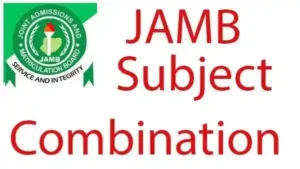JAMB Subject Combination for Economics: For candidates aspiring to study Economics in Nigerian universities, the required JAMB subject combination is:

JAMB Subject Combination for Economics
- English Language (Compulsory for all candidates)
- Mathematics (Compulsory)
- Economics (Compulsory)
- Any of the following: Government, Geography, History, Literature in English, French, or any other social science or commercial subject.
This combination ensures that candidates have a balanced understanding of mathematical concepts and social sciences, which are crucial in economics.
O’ Level (WAEC/NECO) Requirements for Economics
Candidates must have at least five (5) credit passes in their O’ Level (WAEC/NECO) in the following subjects:
- English Language (Compulsory)
- Mathematics (Compulsory)
- Economics (Compulsory)
- Any two of the following: Government, Commerce, Geography, or Accounting
These subjects provide the fundamental knowledge needed for the study of economics and related fields in social sciences.
List of Nigerian Universities Offering Economics
Here are some universities in Nigeria that offer Economics as a degree program:
- University of Lagos (UNILAG)
- University of Ibadan (UI)
- Obafemi Awolowo University, Ile-Ife (OAU)
- University of Nigeria, Nsukka (UNN)
- Ahmadu Bello University, Zaria (ABU)
- University of Ilorin (UNILORIN)
- University of Benin (UNIBEN)
- Lagos State University (LASU)
- Covenant University, Ota
- University of Port Harcourt (UNIPORT)
- Bayero University, Kano (BUK)
- Nnamdi Azikiwe University, Awka (UNIZIK)
- University of Jos (UNIJOS)
- Delta State University, Abraka (DELSU)
These institutions offer accredited programs in Economics, focusing on the analysis of economic systems, microeconomic and macroeconomic principles, and public policy.
Job Opportunities for Economics Graduates
Economics graduates have a wide range of career opportunities in both the public and private sectors. Some potential job roles include:
- Economist: Analyzing economic data, forecasting trends, and advising on policy or business strategies.
- Financial Analyst: Evaluating financial data and trends to help companies and individuals make investment decisions.
- Investment Banker: Assisting organizations in raising capital, advising on mergers and acquisitions, and managing financial portfolios.
- Policy Analyst: Researching and analyzing economic policies and their impact on the economy or specific sectors.
- Banking Officer: Working in commercial, investment, or central banks, performing tasks related to loans, investments, or economic policy implementation.
- Business Consultant: Providing expert advice to businesses on strategy, performance, and economic forecasts.
- Data Analyst: Interpreting large datasets to provide actionable insights for companies or government agencies.
- Researcher/Academic: Conducting academic or industry-related research, writing reports, and teaching at institutions.
- Market Research Analyst: Gathering and analyzing data to understand market trends, customer preferences, and competitive landscapes.
- Public Sector Economist: Working for government agencies or international organizations such as the World Bank, IMF, or NGOs on economic development projects.
Economics graduates can work in industries such as finance, consulting, banking, government, international organizations, research institutes, and non-profit organizations, or pursue further studies in specialized fields like development economics, financial economics, or econometrics.
Jamb Subject Combination FAQS
Where can I find the official JAMB subject combinations?
The official JAMB subject combinations are listed in the JAMB brochure, which is available on the JAMB website: www.jamb.gov.ng.
What if my subject combination is not accepted by my chosen institution?
If your subject combination does not meet the requirements of your chosen institution, you may:
- Change your course to one that matches your combination.
- Wait for the next JAMB registration and choose the correct combination.
Can I use D7 or E8 in my O’Level results for JAMB subject combination?
Most institutions require at least a credit (C6) in relevant O'Level subjects. However, some schools may accept D7 or E8 for certain subjects. Check the specific requirements of your chosen institution.
Can I combine Science and Art subjects in JAMB?
Yes, but only if your course of study allows it. For example:
- Geography: English, Geography, and any two of Mathematics, Biology, Chemistry, or Physics.
- Psychology: English, Biology, and any two of Mathematics, Economics, or Government.
What are the subject combinations for Social Science courses?
For Social Science courses, the combination usually includes:
- English Language
- Mathematics
- Economics
- Government or Geography.
For example:
- Economics: English, Mathematics, Economics, and any other Social Science subject.
- Accounting: English, Mathematics, Economics, and Commerce or Accounting.
What are the subject combinations for Art courses?
For Art courses, the combination typically includes:
- English Language
- Literature in English
- Government or History
- Any other Art or Social Science subject.
For example:
- Law: English, Literature, Government, and any other Art subject.
- Mass Communication: English, Literature, Government, and Economics.
What are the subject combinations for Science courses?
For most Science courses, the combination includes:
- English Language
- Mathematics
- Physics
- Chemistry
- Biology (depending on the course).
For example:
- Medicine: English, Physics, Chemistry, Biology.
- Engineering: English, Mathematics, Physics, Chemistry.
- Computer Science: English, Mathematics, Physics, Chemistry or Biology.
Is English Language compulsory in JAMB?
Yes, English Language is compulsory for all candidates, regardless of their course of study.
What happens if I choose the wrong subject combination?
Choosing the wrong subject combination can lead to disqualification from your desired course, even if you score high in the UTME. Always verify the correct combination before registering.
Can I change my subject combination after registering for JAMB?
Yes, you can change your subject combination, but it must be done before the exam. You can make changes during the JAMB correction of data period, which usually attracts a fee.